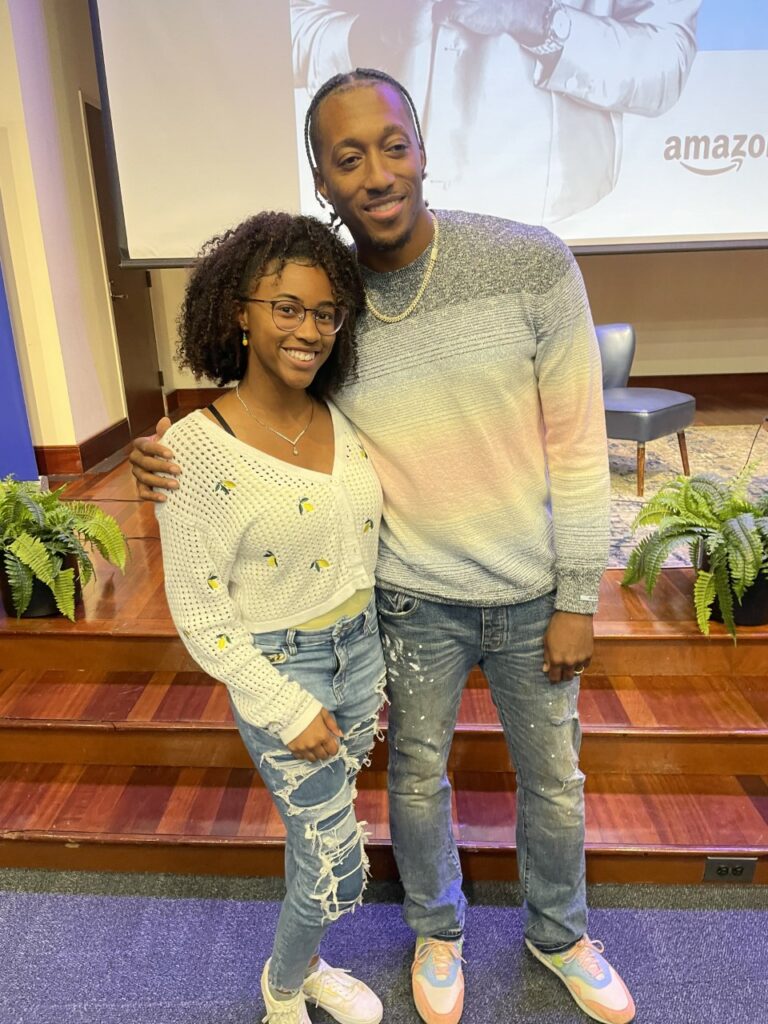Introduction
When thinking about hip-hop music and culture, it has immensely evolved since its creation in the 70s. Today, it is difficult for the traditional elements of hip-hop to be seen, and some go as far as to say present-day hip-hop artists have diverged from the original purpose of hip-hop to be a “voice to the voiceless” (Harris 14). Nonetheless, there are still artists aiming to change the stereotypical narratives associated with hip-hop and its performers by bringing their individuality to the scene, namely Lecrae Moore. Lecrae Moore, mononymously known as Lecrae, self-describes as “authentically Christian and authentically hip hop” (Harris 19). Through his distinctive sound and thought-provoking lyrics, Lecrae challenges stereotypes of hip-hop and Black Americans and provides a countercultural definition of what it means to be a Christian.
Background
Lecrae Moore was born in Houston, Texas, in 1979, but he moved to various cities such as San Diego, Denver, and Dallas. (Harris 17). In a listening party for his latest album, Church Clothes 4, at Spelman College on November 11th, Lecrae said, “I come from, you know, a single-parent household. My father was a drug addict in and out of prisons. Part of my uncles were gang members. So I was lured into that world, and that was what I thought a man was supposed to be” (Moore). Lecrae’s background in the hoods of different cities can be credited as the reason his music connects to many marginalized people because he speaks from a place of experience and relatability. In “Dirt” off of his latest album, Lecrae raps:
My mama told my uncle he gon’ end up on a shirt
Took me on a mission, showed me how to put in work
They say when you see the opps, you squeeze until it hurt
Get me off the block before they put me in the dirt (1:15-1:30)
Lecrae depicts his time living in the hoods of the many cities he grew up in, and although trying times, his difficult experiences and childhood make his music more cathartic and relatable for his target audience. In a 2013 interview, Lecrae said, “…I’ve been learning to one, make good music, but two, resonate and relate with people and not be so into trying to give a theological discourse in four minutes. But many there’s a song that needs to be written about my past or maybe there’s a song that needs to be written about a relationship between me and my father who I don’t have a good relationship with. Those are the types of things I think people resonate and relate to” (Moore). Lecrae is bridging the gap between the sacred and the secular through his honesty and dedication to being authentically Christian and hip-hop.

Through the Music
In 2004, Lecrae released his first studio album, Real Talk. Since that release, he has released 13 studio albums, won two Grammys, and done several world tours. Lecrae’s success can be attributed to many things. However, one can determine that music is the most fundamental reason he has been elevated to great influence and fame. As one can imagine, Lecrae’s music has evolved immensely since his first album almost 20 years ago. Lecrae remarked in an interview, “A lot of us like music that is circular, it goes ‘round and around, but the music that really changes people and inspires people- it goes all over the place…it goes all around again, but it takes you on a journey….” (Moore) This is what Lecrae aspires to do with his music.
A lot of us like music that is circular, it goes 'round and around, but the music that really changes people and inspires people- it goes all over the place...it goes all around again, but it takes you on a journey.
Lecrae in an interview at Spelman College Tweet
Let us take “Take Me as I Am” off his first album, Real Talk, for example. The track is straightforward and repetitive; he stacks his vocals and sings in a loud voice to convey the urgency of his plea, “Will you take me as I am?” (1:21) Lecrae does not use any singers in the chorus; this song is pure rap.
On his Grammy-award-winning album, Gravity, released in 2012, Lecrae has a different approach in the song “Tell the World” featuring Mali Music. He incorporates piano, strings, and raps on top of vocal harmonies. Mali Music sings the chorus of his song, one of the most significant differences between Lecrae’s earlier music and the songs he releases now. While he still has songs where he purely raps, his songs now include more elements of pop, R&B, and even a little funk (See “Good Lord” from Church Clothes 4).
On a collaboration album with Zaytoven in 2018, Let the Trap Say Amen, Lecrae’s lack of a singer for the chorus reflects his earlier works on the song “Get Back Right.” Lecrae incorporates background improvisations reflective of other contemporary rap artists such as Travis Scott and the Migos. Lecrae and Zaytoven use an exciting mix of bell-like sound effects, dreamy guitar, a strong beat, and a classic hip-hop syncopation beat. Lecrae also raps in a more relaxed style compared to “Tell the World” or “Take me as I am.”
Lastly, on the 2020 album, Restoration, Lecrae yet again makes it difficult for his audience to classify Lecrae’s sound into one distinct musical box. In his song “Only Human” featuring BJ the Chicago Kid, Lecrae includes string instruments, a bass guitar, electric guitar, electronic sounds in the background, and adds vocal effects throughout the song. Again, his rap style is also more relaxed than “Take Me as I Am.”
After this brief analysis of Lecrae’s music, one can see the similarities and differences in his music from 2004 until the present day. Lecrae has strived to take his listeners through a journey that is reflective of the changes and continuity of the human experience. Listeners can rely, however, on Lecrae’s honesty, vulnerability, and love of Jesus.
With the release of Church Clothes 4 (CC4) on November 4th, Lecrae wraps up his album series, which has been a work in progress since 2012. Throughout this series, Lecrae discusses the congruences of his faith and hip-hop, calls out the Christian Church for its shortcomings, and discusses societal problems. In Church Clothes 4, he borrows verses and cadences from his previous albums to have a full-circle moment. This is most easily seen with “Welcome to America” from his 2014 album Anomaly and “Still in America” off of CC4. The songs begin similarly with an airplane pilot telling the passengers over an intercom that they have arrived in America. Lecrae raps about issues such as immigration laws, racism, gun control, and more. Including chants from Native American tribes and African drums in the background adds another level of creativity and is a respectful nod to both minority groups.
Beyond Preaching the Word
Songs such as Still in America set Lecrae apart from other Christian artists. He does not see issues in society and his faith as two different sectors but as interconnected in a myriad of ways. In his journal article, Travis Harris perfectly summarizes Lecrae’s goal: “The movement that Lecrae both leads and invests in challenges Hip Hop to go back to its roots of providing a voice to the voiceless and addressing the issues that the disenfranchised of American society confronts” (15). Lecrae challenges the notion of secular and sacred in his works since there is typically no separation. Lecrae is unafraid to call out the wrongs he sees in the world and those in the Church. Through the transparency in his lyrics, Lecrae embodies hip-hop’s initial goal of being a voice for the voiceless.
Additionally, Lecrae goes beyond just talking the talk, he dares to walk the walk. On his website page, he is described as “a New York Times bestselling author, entrepreneur, speaker, thought leader, philanthropist, and co-owner/president of Reach Records” (I am Restored, Book). Lecrae is an active member of the Atlanta community. One of the most evident examples of his community service is his foundation and continuous nurture of Peace Preparatory Academy in West Atlanta. “Peace Prep,” as he calls it, was founded in 2015 by Benjamin Wills and is an elementary school aimed at supporting the “Whole Child. Whole Family. Whole Community” (Peace Preparatory Academy). Through such efforts, Lecrae goes beyond just talking about problems he sees in the world; He tackles them head-on himself.
In an interview with Lecrae Moore on November 11th at Spelman College, I got the unique opportunity to meet Lecrae and ask him questions about his music and life. When asked about how he deconstructed and rebuilt his faith, he mentioned traveling abroad and learning the historical context of the Bible (Moore).

Conclusion
Lecrae Moore is an innovative and promising artist who aims to glorify God in his songs and substantially change the lives of those around him. Some sources have claimed that if the Christian Church wants to maintain relevance, they should turn to artists like Lecrae because of his successful fusion of the Gospel, popular music, and societal issues (Razzante and Smith 66). Lecrae challenges stereotypes of Hip hop, Christianity, and being Black in America through his music, lyrics, and how he lives his life. Lecrae shows his audience how to rise above life’s challenges by pointing them to Jesus. The last song on CC4, “Deconstruction,” is about Lecrae’s experience with Christianity and how he had to rediscover what being Christian means. He ends on a hopeful note, rapping,
My Peace has been cemented, my soul has been re-lifted/ My deconstruction ended, reconstruction is beginning
Deconstruction, Lecrae 2022 Tweet
Works Cited
Moore, Lecrae. Interview. Conducted by Nia Curry, 11 November 2022.
Moore, Lecrae. “Dirt.” Spotify.
https://open.spotify.com/track/2XuMkXnhQVo8eU1rqrdiZH?si=a20b2c05bf8647f5
Travis Harris. “Refocusing and Redefining Hip Hop: An Analysis of Lecrae’s Contribution to Hip Hop.” The Journal of Hip Hop Studies, vol. 1, no. 1, Mar. 2014, pp. 14–37.
Moore, Lecrae. “Take Me as I Am.” Spotify.
https://open.spotify.com/track/3vIwWH3GKJ102nz3RSym5g?si=77b6e20899b84630
“Lecrae Extended Interview.” PBS.org, 7 Feb. 2013, www.pbs.org/video/religion-and-ethics-newsweekly-lecrae-extended-interview.
Moore, Lecrae and Mali Music. “Tell the World.” Spotify.
https://open.spotify.com/track/2s1imOhCAAdApnMs5zZUYG?si=e9e74d886b024123
Moore, Lecrae and Zaytoven. “Get Back Right.” Spotify
https://open.spotify.com/track/3Rmc1J4r9rG60101cOGg5B?si=0df19c83b5114fc2
Moore, Lecrae and BJ the Chicago Kid. “Only Human.” Spotify
https://open.spotify.com/track/3DT3Xgm1YPqRpIRNKAFTQQ?si=00b48c28516c47c5
Moore, Lecrae. “Welcome to America.” Spotify
https://open.spotify.com/track/3YAUHKKgknXXpPKvczjNdf?si=b4e67afe76f74c07
Moore, Lecrae. “Still in America.” Spotify
https://open.spotify.com/track/3ZzQQZcaLD8S1IgblayfX6?si=84918b421ccd42ef
“I Am Restored (Book).” Lecrae, lecrae.com/restored.
“Peace Preparatory Academy.” https://peaceprep.com/, 2019, peaceprep.com.
Moore, Lecrae. “Deconstruction.” Spotify
https://open.spotify.com/track/48cH50ZdsbX4ehT9e1ARl9?si=b10e5555ab8d4cb7


